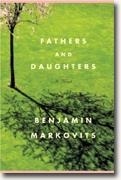Fathers and Daughters
Benjamin Markovits
book reviews:
· general fiction
· chick lit/romance
· sci-fi/fantasy
· graphic novels
· nonfiction
· audio books
· author interviews
· children's books @
curledupkids.com
· DVD reviews @
curledupdvd.com
newsletter
win books
buy online
links
home
for authors
& publishers
for reviewers

 |
Fathers and Daughters Benjamin Markovits W.W. Norton Hardcover 224 pages October 2005 |
|
Through four connected stories, each defined by a season, the author surgically dissects the private dramas of four protagonists connected by family, occupation or acquaintance. These complicated father-daughter relationships reveal how people maneuver around private prejudices and selfish mistakes. With characters defined by the small, brittle judgments we make but keep to ourselves, a subtle poignancy resonates throughout Fathers and Daughters.
When Howard Peasbody (“Winter”) is contacted by a woman from his past, he is astounded to learn that he has a daughter. Thoroughly gay, Howard thought only to meet this old flame and reminisce, while his younger lover waited at home. Listening to the mother of his child, Howard reassesses his response to her shocking news, considering that he has manipulated facts to fit his take on the world: “It occurred to him once more that he might be looking through a distorted lens.” Retreating from vulnerability, Howard reasserts himself, willfully concealing his self-destruction, cold seeping like ice to separate him from his feelings. Another teacher, Stuart Englander (“Spring”), has reached a plateau, everything hopelessly banal but for one of his students, Rachel Kranz. His wife’s bulk asleep beside him, Stuart’s pre-dawn imagination is involuntarily fixated on the nubile student. The marriage retaining little animation, the union balances on intuition: “Childlessness had kept them childish.” Stuart is awakened by spring only to be confronted by his failures. In similar fashion, “Summer” features Rachel Kranz, the object of Stuart’s desire. Rachel has her own problems, caught in the middle of her parents’ divorce, her self-image collapsing with each new doubt. Her youth and natural beauty have too often been a passport to accommodation, and Rachel must come to terms with a loss that will alter everything familiar, desperate for comfort before being thrust into an indifferent world. Precisely drawn, these people are exposed to the marrow, blindsided by their flaws: given the choice, “he wouldn’t have chosen her. So this was the stuff he was made of.” For the most part, these characters are unlikable, yet they remain utterly fascinating, accessible through universally human flaws. Victims and beneficiaries of their intellects, the protagonists are grounded in academia, both yearning and self-defeating, on the cusp of change but beyond ambitious gestures. Originally published on Curled Up With A Good Book at www.curledup.com. © Luan Gaines, 2005 |
| Also by Benjamin Markovits: |
|
|
|
 Click here to learn more about this month's sponsor! |
|
| fiction · sf/f · comic books · nonfiction · audio newsletter · free book contest · buy books online review index · links · · authors & publishers reviewers |
|
| site by ELBO Computing Resources, Inc. | |
 In “Fall”, Amy Bostick moves to New York after four years of college, ready to accept a job in a prestigious private school. Amy is charged with a mission, believing her father expects her to live the life he failed to experience; only forty-seven, he has begun a slide into middle age, false teeth, thinning hair and a growing paunch. Amy senses that her pride of place is slipping, her life a footnote rather than the center of attention, especially when her younger brother achieves his belated artistic success. Anticipating her family’s Thanksgiving visit, Amy hopes to share the old with the new, only to learn that expectations breed regret.
In “Fall”, Amy Bostick moves to New York after four years of college, ready to accept a job in a prestigious private school. Amy is charged with a mission, believing her father expects her to live the life he failed to experience; only forty-seven, he has begun a slide into middle age, false teeth, thinning hair and a growing paunch. Amy senses that her pride of place is slipping, her life a footnote rather than the center of attention, especially when her younger brother achieves his belated artistic success. Anticipating her family’s Thanksgiving visit, Amy hopes to share the old with the new, only to learn that expectations breed regret.